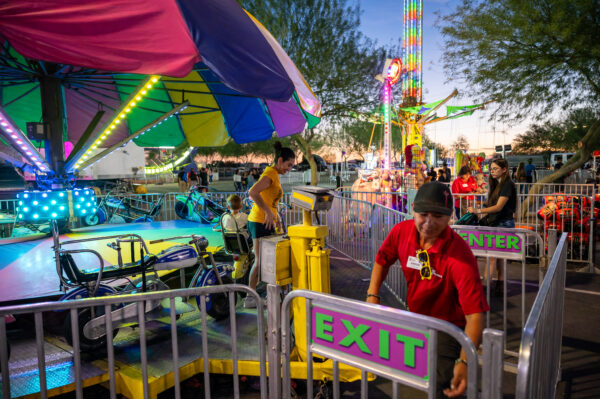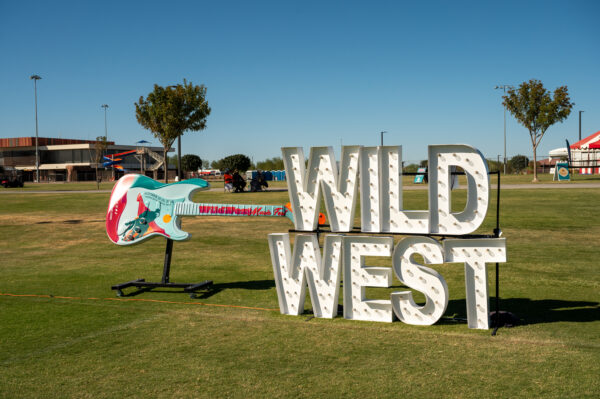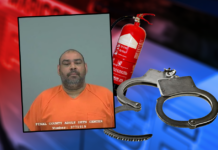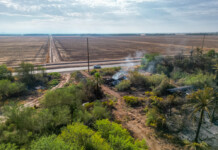It took nearly four months for the city to learn it lost its entire taxpayer investment on the inaugural Wild West Music Fest, held Oct. 13-15.
After looking at the financials, it’s clear why the city and Steve Levine Entertainment, the event’s producer, wanted to wait so long to announce attendance figures and accounting — and did so in such an opaque manner.
To gain a better understanding of how this opacity manifests itself, one must understand how Freedom of Information Act requests work. Only government entities are beholden to a FOIA request and only if it exists in their database.
SLE is a private company and is not required to respond to such requests.
The partnership between the two sets up a “Who’s on First?” routine where both sides can point at one another with neither having to give up the requested information.
For example, the contract between SLE and the city stipulated SLE would provide the city with weekly progress reports that included ticket sales, marketing efforts and sponsorship and vendor reports.
FOIA requests reveal there is no record of those contractually agreed progress reports.
This means one of two things. The city never enforced this part of the contract, or the reports were given verbally to avoid the inconvenience of a written record of facts neither side wanted to become public.
Take your pick — avoiding transparency or incompetence.
Spearheaded by the efforts of Chief Operating Officer Rick Horst, the city now has solid ideas to significantly lessen, if not eliminate, the festival’s burden on Maricopa taxpayers through a hotel tax. However, none of those ideas mean much unless these transparency issues are repaired.
With the return of the Wild West Music Fest imminent this fall, hopefully, there’s light at the end of the tunnel and viability will improve for its second iteration. And maybe that light is an oncoming train. Only time will tell.
‘Those who fail to learn from history are doomed to repeat it’
It’s important to examine, to the extent we can, how the city spent $370,000 of taxpayer money, along with hundreds of thousands of additional dollars in paying city staff to help plan and produce an event that already had a producer.
According to the contract signed in July, the city and SLE would split the profits 50-50 after the expenses for the event were covered. Alas, there were no such profits to share. The event’s overall expenses exceeded $1 million, and the event finished with a deficit of $251,449.
Revenues included a $370,000 investment from the city, which was the festival’s largest contribution by far. Next was $230,253 in ticket sales.
A month after the event, a city official estimated the attendance to have been as high as 20,000.
SLE gave its official attendance figure as 15,000 to 17,000 as part of its final reports in mid-February.
In the world of live sports, officials can offer an accurate attendance figure, to the number, in a matter of hours for events that draw upwards of 100,000 people. Why we don’t have a clear figure months after the event is puzzling.
Regardless of whether turnout was lower than expected, an actual attendance figure would have instilled more confidence in the accuracy of the numbers that came back from the event and its producers.
Going by the “official” numbers we have, the average ticket sold for between $13 and $15.
Ticket prices for the first two days, which dominated attendance, ranged from $30 to $300. If you take the high end of the official attendance range, 17,000, and assume attendees all purchased the least expensive ticket price for the first two days, ticket revenue would have been $510,000 and that would have pushed the event into profitability and the city would have gotten $15,000 back, after the 50-50 split of course.

Clear as mud
SLE provided nothing more to the city than a broad financial statement that, in many cases, combined expenses that had little to do with one another. Staging, audio and visual costs shared a line item with booze at the bar.
SLE did not give city leaders legitimate accounting of just what went on last year — and the city took no issue with that.
The Wild West Music Fest earned $102,750 in sponsorships. The bar brought in $76,793, vendor fees accounted for another $28,375 and parking revenues were $18,134.
The biggest expense was $482,981 for midway rides and talent, two more largely unrelated costs lumped together in the accounting.
The next biggest expense was $271,007 for the stage, audio-visual effects and the bar. An online search reveals the stage used for the festival, a Stage line SL320, could be rented for $10,000 a day.
SLE’s personnel costs for the festival were reported at $202,752, which could pay a staff of 126 people to work 80 hours each at an average rate of $20 per hour. Or the yearly salary and benefits of two city employees.
The last two expenses, marketing and charity, demonstrate the stark lack of connection between promoters, the city and its citizens.
The marketing fees were $34,883.
Although navigating State Route 347 is a hazard few from the Valley want to undertake, efforts to market to the 75,000 people who live in Maricopa were all but abandoned as 93% of the marketing funds went to attract Valley residents.
Despite the festival ending in a sizable deficit, promoters still found money to donate $17,083 to Magical Builders, a national charity that “manages the construction, renovation and improvement of charitable facilities and other initiatives.”
The charity hasn’t announced any projects in or near Maricopa. Its efforts in Arizona focus on Phoenix and Scottsdale, a city more than 25% richer than Maricopa on average.
Monetizing vendors
At the outset of last year’s Wild West Music Fest, there was an outcry from prospective local vendors.
A $500 deposit, $50 registration fee and $50 terminal fee, along with a 20% take of their final receipts left some feeling the terms were too harsh. The vendors were also required to go cashless to ensure they coughed up 20% of their profits.
Many of the vendors who set up shop at the event didn’t want to talk on the record with InMaricopa for fear of retribution from the city. Most, however, were willing to confirm they remained cashless after the event.
Much of the outrage came on the city’s Facebook page under a posting “Calling all vendors.”
Jill Schrupp, a Maricopa resident who runs a handmade crafting business and frequents other events said, “It’s not affordable and it’s not financially acceptable in my opinion to line the pockets of a promoter based off of my hard work and sales.”
Schrupp blamed the promoter.
“I do not hold it against the city, and I look forward to being a vendor at city of Maricopa-run events in the future, but this is not an event I will partake in or promote,” she said. “They are pushing out the little people.”
Schrupp explained after the deposit and rental fees, she’d be down $700 before selling her first item.
Michael Franz, who runs the Sofritos Tan Rico food truck in Maricopa, said his upfront costs would be higher than that once the $375 electric and $500 placement fees were added.
As a result, he decided the event wasn’t for him.
“I figured that it was going to cost me $1,500 up front,” he said.
Local woodworker Brian Hussey said, “They want an arm and a leg. You have to use their point-of-sale system and give them 20% of all your sales, plus you have to rent the POS system from them. A joke!”
There were 39 vendors at the Wild West Music Fest. On average, each paid $728 just for the privilege of being there.

Hold ya horses, partner
Earlier this year, a flutter of headlines announced the return of the Wild West Music Fest, maybe a little prematurely.
Mayor Nancy Smith signaled its return at her State of the City address Jan. 31, when she said, “The overwhelming positive response has fueled our determination to bring back this epic festival.”
Smith’s statement came despite the event being not yet on the budget and not being approved.
At a closed-door budget meeting two nights before Smith’s address, City Councilmembers Vincent Manfredi, Eric Goettl and Smith, all members of the budget committee, discussed bringing back the event this year.
“The budget won’t be approved until June,” said Manfredi, who opposes another Wild West Music Fest. “But if they want to do it in October, they’ve got to start talking about it now.”
Discussion is one thing, but Smith’s announcement sent things into overdrive as news outlets reported it was a done deal.
Horst said while there’s a will, the way hasn’t yet been set.
“I want to emphasize that the city council has not formally agreed to move forward, although it seems to have postured that they are interested in moving forward,” Horst said. “There are decisions that still have to be made.”
Those decisions include everything from the duration of the event to selecting a promoter.
While it’s likely SLE will repeat as the event’s promoter, the city could still choose a new promoter, Horst explained.
“It could very well be SLE,” Horst said. “There’s certainly a benefit to having a producer familiar with our city and our demographics versus contracting out to another [company]. But to be quite frank, that decision hasn’t yet been made.”
Lessons learned
Smith said last year’s challenges will be addressed this year.
“The city learned a lot from the first event, mostly in the area of inefficiencies,” she said.
Lackluster ticket sales on the final day of last year’s three-day festival means this year’s affair is likely to be trimmed by a day, Horst said.
“A two-day event is likely,” Horst said. “It’s still a little premature, but it certainly will not be a three-day event. I anticipate a Friday to Saturday event. Sunday was our weakest showing at the last event and we learned from it.”
“I think this time, we have to use a broader marketing approach to attract people from outside of the community, and at the same time, we want to make sure that we use our local marketing resources to better attract and communicate with our own community,” he said.

Differing opinions
While last year’s event saw considerable challenges in financing, marketing and transparency, the people who attended were generally pleased with the experience and most council members said they felt it was a good representation of the city.
Goettl said he feels there are solid economic and quality-of-life justifications for bringing the festival back this year.
“Part of the small-town charm Maricopa has enjoyed over the past two decades has been made possible by our community events,” he said. “The old Stagecoach Days, Salsa Festival and Copa Cultural are examples. The Wild West Music Fest is the next generation of these types of events that will not only be enjoyed by our residents but will also attract individuals outside our community to Maricopa.”
Although he opposes bringing the festival back annually, Manfredi understands an event is likely to happen this fall.
“I’d be happy canceling it altogether,” Manfredi said. “But if the council put it to a vote, I’d lose that vote 6-1.”
Manfredi went to the festival on the last day with his wife.
“It was nice,” he said. “We had a good time. But the reality of it to me is that I don’t think it was worth the money, even if it was for a celebration or anniversary party. But it is what it is. You can’t win every vote.”
Manfredi now wants to focus his energy on encouraging financial restraint.
“I’m going to push for more oversight than we had last time,” Manfredi said. “I don’t want to spend anywhere near what we spent last year on the event. I just don’t have the appetite for it.”
From a fiscal standpoint, unlike the producers and city staff, Manfredi didn’t have high expectations to begin with.
“Last year’s event was an anniversary party — and who expects to make money off a party? I thought we’d break even, but obviously we didn’t,” he said.
Smith, the third member on the council’s budget committee, said the festival has internal and external potential.
“The event is part of our tourism strategy to bring outsiders into our city and to showcase our city, adding revenue benefits for our businesses,” she said. “It’s also an entertainment opportunity for our own residents.”
Rancho El Dorado resident Bejean Page attended the festival and said she had a blast. She was impressed with the way the event was operated.
“Parking, safety and cleanliness were great,” she said, also noting appreciation for the $75 alcohol band that included a meal.
Page said she enjoyed the secondary country music performances over the rap headliners, “although I’m glad they offered different types of music.”
Page offered a few suggestions for improvement.
“Add the Salsa Fest to the community day for all the whiners,” she said. “Also have the vendors stay open later after the concert.”
A new way forward
Horst succinctly summed up the city’s new approach to the event.
“The party’s over,” Horst said of the festival, which celebrated the city’s 20th anniversary.
Horst explained from the way the city helps fund the festival to tweaks in the event’s operation, the Wild West Music Fest is going to look different this time around.
“This is about business,” Horst said. “This event is now an economic engine opportunity, not a birthday party for the city.”
This year, under a new plan, Horst said the funding will change both in the amount and the source of those funds.
Assuming passage by council members, the city’s funding commitment for the 2024 Wild West Music Fest will top out at $290,000. The money for the festival will come from three sources:
- $242,000 Bed Tax Revenue
- $25,000 city-solicited sponsorships
- $23,000 general fund
It’s all about the beds
Maricopa’s bed tax collections last year were $263,000. Of the 5.5% the city collects, 5% will go to the Wild West Music Fest with the remaining half percent going to fund arts initiatives.
The bed tax is a relatively new revenue stream for the city, which saw its first hotel open only a few years ago. It goes by many names — occupancy tax, travel tax and lodging tax. Arizona’s travel board refers to it as a transiency tax. The tax is aimed at visitors instead of residents.
In Arizona, bed tax rates vary. In Maricopa, it’s set at 12.4% with 5.5% going directly to the city. The rest goes to the county and state. The lowest bed tax in Arizona is Huachuca City at 8%. The highest rate is in Colorado City at 20%.
Goettl, who sits on the council’s budget finance committee, prefers the new funding mechanism.
“One of my most important responsibilities is to be fiscally responsible in how our city spends the taxpayer’s dollar. Finding a way to self-fund this event so it will have little impact on our general fund is important to me,” Goettl said.
He noted the bed tax was created for events like the Wild West Music Fest.
“The state of Arizona legislates that the bed tax is to be spent to support tourism,” he said. “It is appropriate that these monies go to support the Wild West Music Fest.”
Horst added this tax has no effect on Maricopans’ tax bills.
“This is a tax that only applies to visitors who spend the night in a hotel in the city limits,” Horst said. “No one who lives in Maricopa will ever pay this tax.”
Goettl is hopeful the event will sustain itself for years to come.

“This will make this event self-funding while infusing thousands of dollars into our local economy,” he said.
Horst said the bed tax only funds the Wild West Music Fest. All other events the city organizes, like the night markets, would come from the general fund.
Editor’s Note: Vincent Manfredi is an owner of InMaricopa.



![In mayoral race, it’s the Nancy Smith show Maricopa Chamber of Commerce Executive Director Kelly Anderson grills incumbent Mayor Nancy Smith in election's first campaign event April 30, 2024, at Southern Dunes Golf Club. [Elias Weiss]](https://www.inmaricopa.com/wp-content/uploads/2024/04/CRM_1009-218x150.jpg)
![Merging lanes incite more 347 anger A merging lane sign sits on the side of State Route 347 northbound lanes during evening traffic on April 30, 2024. [Monica D. Spencer]](https://www.inmaricopa.com/wp-content/uploads/2024/04/spencer-043024-adot-merging-lanes-347-web-218x150.jpg)


![Maricopa restaurateur makes Food Network connection [Namkeen Dhaba]](https://www.inmaricopa.com/wp-content/uploads/2024/04/439456716_377105198650519_7536248579664805896_n-218x150.jpg)




![City gave new manager big low-interest home loan City Manager Ben Bitter speaks during a Chamber of Commerce event at Global Water Resources on April 11, 2024. Bitter discussed the current state of economic development in Maricopa, as well as hinting at lowering property tax rates again. [Monica D. Spencer]](https://www.inmaricopa.com/wp-content/uploads/2024/04/spencer-041124-ben-bitter-chamber-property-taxes-web-218x150.jpg)


![In mayoral race, it’s the Nancy Smith show Maricopa Chamber of Commerce Executive Director Kelly Anderson grills incumbent Mayor Nancy Smith in election's first campaign event April 30, 2024, at Southern Dunes Golf Club. [Elias Weiss]](https://www.inmaricopa.com/wp-content/uploads/2024/04/CRM_1009-100x70.jpg)
![Merging lanes incite more 347 anger A merging lane sign sits on the side of State Route 347 northbound lanes during evening traffic on April 30, 2024. [Monica D. Spencer]](https://www.inmaricopa.com/wp-content/uploads/2024/04/spencer-043024-adot-merging-lanes-347-web-100x70.jpg)
